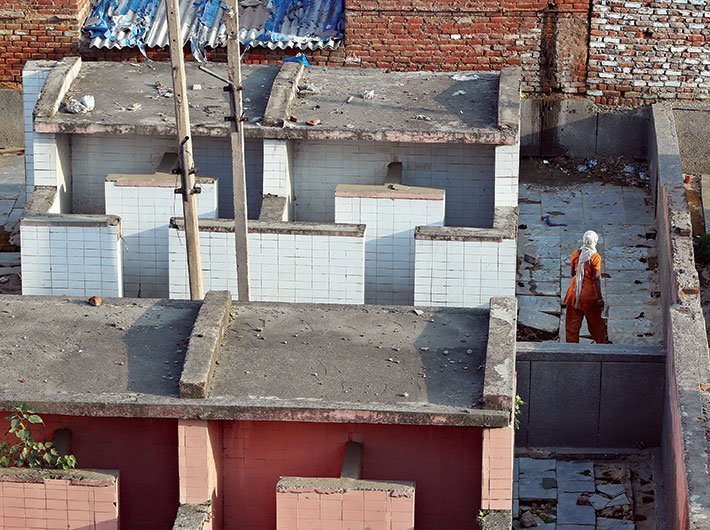Corporate sector has contributed in making India clean, but the mission has to go beyond creating physical infrastructure and work to change social norms and attitudes
The Swachh Bharath Abhiyan was launched in 2014 to eradicate open defecation (OD) by 2019 and make India open defecation free (ODF). The program focused on providing subsidies for the construction of toilets to remove the financial constraint faced by the households as well behaviour change communication (BCC) campaigns to help people recognize the harms of OD.
One of the less discussed aspects of the program has been the call for active participation from companies to contribute to the ODF goal through their corporate social responsibility (CSR) funds. CSR is a way for the businesses to regulate themselves to contribute to all aspects of society, like, economic, social and environmental. Yet, even three years after the end of SBM, little is known about the role of CSR in water, sanitation and hygiene (WASH). To answer this question, we discuss one of the pioneering studies conducted by Samhita Social Ventures Pvt. Ltd. The report [https://samhita.org/report/csr-in-wash-what-are-indias-top-companies-up-to/] analyses CSR efforts in WASH by the 100 companies with the largest CSR budgets on the BSE 500.
The study showed that the corporate sector responded enthusiastically as 90 out of the 100 companies had participated in at least one CSR intervention in the WASH sector since the launch of SBM. This brings us to another pertinent question: which industries led the way in supporting WASH efforts? Heavy engineering and manufacturing (HEM) and fast-moving consumer goods (FMCG) industries. This can be explained through their vested interest in the development of the WASH sector. For instance, the FMCG sector manufactures products like soaps, sanitisers and disinfectants, all of which will undergo a higher sale, if the WASH sector develops. Similarly, the construction of sanitation facilities would imply higher growth of the HEM sector.
Research also reported that the CSR activity was aligned with the needs of the states: Maharashtra, Uttar Pradesh, Rajasthan, Gujarat, and others saw the highest spending of CSR activities on sanitation and this was associated with the scale of the OD rates. The only exception was the neglect of states/UTs like Jammu and Kashmir and states in the northeast. When it comes to regions, 52% of the CSR efforts were concentrated on the rural areas, 17% in the urban areas, and the remaining in areas of mixed geographies. Since OD in India is mainly concentrated in rural areas, the focus of such efforts can be justified. However, further neglect of sanitation-related CSR efforts in the urban areas might have negative repercussions.
One of the most striking findings was that 75% of the companies supported programs that were related to building sanitation facilities. This occurred despite the rigorous research which has proven that OD cannot be eliminated by solely focusing on building infrastructure. OD in India is a practice followed for centuries and is a social norm in rural India. Hence, any tangible change that will eradicate OD will have to include a behaviour change component that changes the attitude of the people towards OD and encourages them to use the toilets.
This leads us to our next question: what about the remaining companies? Did they conduct the BCC activities that will trigger a change in the OD practices? Unfortunately, the answer is no. Of the companies that reported the inclusion of sanitation-related BCC programs in their CSR activities,the majority were related to disseminating the importance of WASH practices and organizing cleanliness drives. While following hygienic practices and generating awareness on the importance of community cleanliness is important, it is also just one aspect of the behaviour change communication (BCC) program. There are specific BCC interventions that make the people aware of the benefits of using toilets, induce a sense of disgust and shame towards the practice of OD, and generates demand for toilets from within the community, which leads to sustained adoption of toilets. The inclusion of such activities in future CSR programs should not be ignored. Another important observation was limited contribution (15% of the total CSR activities) to repair and maintenance of the sanitation facilities.
SBM brought forth sanitation to the national limelight and stirred the conversation from households in rural India to boardrooms of the top corporate companies. However, research suggests that despite the efforts from the corporate sector to contribute to a sanitation change in India, the road ahead is challenging. The recognition that solving the challenge of sanitation in India is as much about the change in social norms and attitudes regarding open defecation as it is about building physical infrastructure is critical. To address this shortcoming, it is important that the key players in the sanitation ecosystem, like civil societies, NGOs, financial institutions, multiple government bodies, and media, engage, coordinate efforts and collectively make efforts to make India ODF.
Payal Seth is a PhD scholar, and Palakh Jain is an associate professor, at Bennett University.
